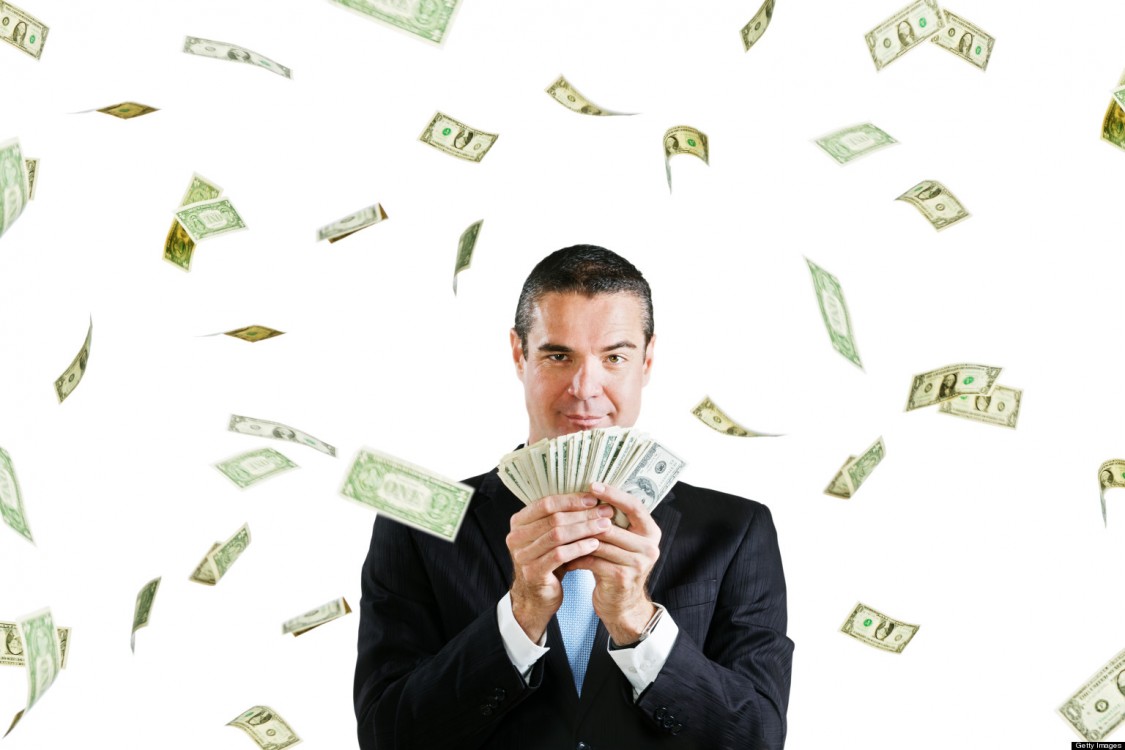
CEOs at the biggest companies got a 4.5 percent pay raise last year. That's almost double the typical American worker's, and a lot more than investors earned from owning their stocks – a big fat zero.
The typical chief executive in the Standard & Poor's 500 index made $10.8 million, including bonuses, stock awards and other compensation, according to a study by executive data firm Equilar for The Associated Press. That's up from the median of $10.3 million the same group of CEOs made a year earlier.
The raise alone for median CEO pay last year, $468,449, is more than 10 times what the typical U.S. worker makes in a year. The median full-time worker earned $809 weekly in 2015, up from $791 in 2014.
"With inflation running at less than 2 percent, why?" asks Charles Elson, director of the John L. Weinberg Center for Corporate Governance at the University of Delaware.
The answer is complicated. In some cases, CEOs got big stock or option packages after signing new employment contracts. In others, boards bumped up salaries to get closer to what their rivals pay. Some CEOs got larger bonuses for hitting profit goals or improving worker safety.
CEO pay packages now hinge on multiple layers of sometimes esoteric measurements of performance. That's a result of corporate boards attempting to respond to years of criticism about excessiveness from Main Street America, regulators and even candidates on the presidential trail this year.
One bright spot, experts say, is the rise in the number of companies that tie CEO pay to how well their stocks perform. "There's progress generally in aligning compensation with shareholder returns," says Stu Dalheim, vice president of governance and advocacy at Calvert Investments, whose mutual funds look for socially and environmentally responsible companies.
"But I don't think this compensation is sustainable long term, because the U.S. population is increasingly focused and aware of the disparity."
Pay Breakdown
More than half the median compensation of CEO pay is coming from stock and options, rather than cash. And companies are increasingly meting out those stock and option awards based on performance.
About a quarter of CEO incentive awards in the S&P 500 use total shareholder return as one of their measurements of performance. That's more than double the percentage from three years earlier. Companies also use familiar measurements like revenue and wonkier ones like return on invested capital.
The tie to shareholder return is one reason the rise in median CEO pay last year was the second-slowest in the past five years. Of the 341 executives in this year's pay survey, the median stock returned zero in the latest fiscal year. Last year's 4.5 percent raise for CEOs was faster than the prior year's 0.8 percent, but well below the 8.8 percent gain of 2013.
Even though CEO pay was up last year when stock returns were flat, big investors don't see it as a necessarily bad thing. Many say they take a longer view, similar to how they hope to hold onto their stock investments for many years.
Capital Group, whose American Funds family of mutual funds rank among the country's biggest, goes back at least three years when considering CEO pay versus performance, says Anne Chapman, vice president of investment operations.
The Standard & Poor's 500 index returned a total of 53 percent in the three years through 2015.
No. 1 On the Chart
The top-paid CEO in this past year's survey, Expedia's Dara Khosrowshahi, made $94.6 million last year. Most of that came from stock options, which came as part of a new five-and-a-half-year employment agreement and which vest over several years. He'll get a chunk of those options, currently valued at $30.4 million, only if he's able to push the stock up to an average of $170 in the run up to his contract's end in September 2020. Expedia stock closed Tuesday at $113.17.
"This is a great example of a pay-for-performance CEO compensation plan," says Sarah Gavin, spokeswoman for Expedia. "He's really led the company in a turnaround, and this is about him continuing to perform and return real value to customers, partners and shareholders over the next five years."
Expedia's stock returned 47 percent last year.
At Viacom, shareholders lost 42 percent in its latest fiscal year, which ended in September. That's even though CEO Philippe Dauman made $54.1 million, a 22 percent raise from the prior year.
Much of Dauman's compensation was due to a contract renewal, which included stock and options that vest over several years. Without the contract renewal, his pay would have dropped 16 percent.
Viacom declined to comment.
The Widening Gap
Scrutiny has been increasing on CEO pay, and many Americans say they feel left behind in the economy even though the Great Recession technically ended nearly seven years ago. This recovery has meant big gains for stocks - and for CEOs - but not so much for the typical household.
Anger is high. Nearly three quarters of Americans believe CEOs are paid an incorrect amount, relative to the average worker, according to Stanford University's Rock Center for Corporate Governance. And that's even though most Americans severely underestimate how much CEOs make. The typical American believes big-company CEOs average $1 million in pay.
Starting next year, companies will have to begin showing how much more their CEOs make than their typical worker. That's when the Securities and Exchange Commission has told public companies to start disclosing the ratio of its CEO's compensation versus its median employee. It's the latest move by the government to shed more light on executive pay.
Giving the O.K. on Pay
While many Americans say they're angry about how much CEOs are making, the boards of directors who set their pay aren't. They say they're setting pay for performance, and in line with their competitors. That culture of benchmarking compensation against peers is one reason why pay keeps escalating, says the University of Delaware's Elson.
"Everyone is being compared to everyone else, and everyone wants to be higher," he says. "We have to get out of this Lake Wobegon and change channels and get back to a pay scheme that's rationally based."
Most shareholders, though, seem to agree with the boards of directors. Stock holders, whether by themselves or through the mutual funds they own, get the opportunity to vote on whether they think CEO compensation is fair at companies' annual meetings. It's called the "say-on-pay" vote, and companies routinely get more than 70 percent of shares voting in favor of pay packages.
Oftentimes, mutual-fund companies say they'd prefer to talk directly with board directors about changing CEO pay, rather than lodge "No" votes at the annual meeting. Many say they get better results, but critics have begun pushing mutual-fund companies and other big stock shareholders with clout to offer up more resistance as CEO pay sets records.
Unanticipated Consequences
Regardless of whether it's fair for CEOs to earn such large checks, a big payday can also be a warning sign for investors. After looking at CEOs' pay and performance from 1994 to 2011, researchers found that the highest-paid CEOs in an industry tend to lead their companies to weaker stock returns in ensuing years.
Michael Cooper, a finance professor at the University of Utah and one of the paper's authors, is quick to say that he can't be sure whether the high pay caused the weaker returns, or whether they're just correlated. But he says a likely explanation is that big paychecks can make CEOs overconfident and lead to wasteful spending decisions.
He's in the midst of updating the data now, to run through 2015, but the trend seems to have held up. "We're building the tables right now," he says. "It's still very strong."
The AP's CEO compensation study includes pay data for 341 executives, including some co-CEOs, at S&P 500 companies who have served two full consecutive fiscal years at their respective companies, who filed proxy statements between January 1 and April 30.
The survey's data is available here.
3 WAYS TO SHOW YOUR SUPPORT
- Log in to post comments
















